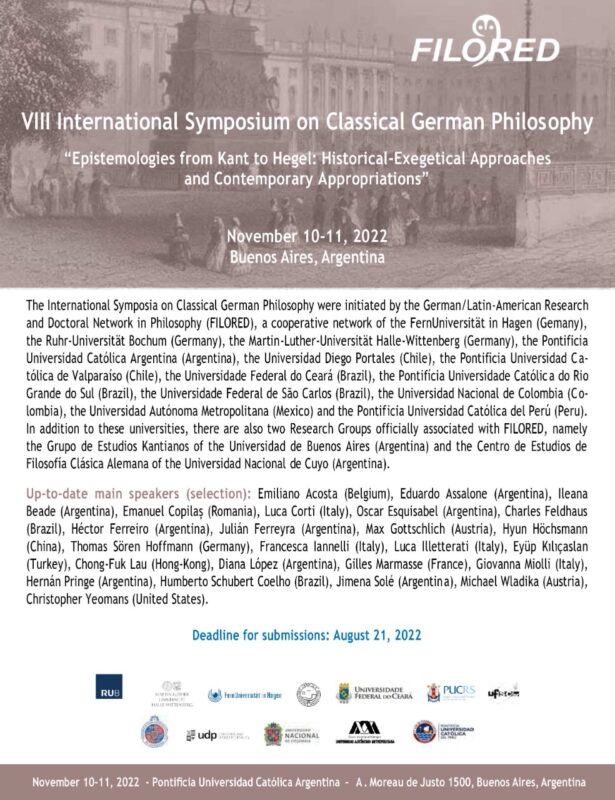We gladly announce that the VIII International Symposium on Classical German Philosophy entitled Epistemologies from Kant to Hegel: Historical-Exegetical Approaches and Contemporary Appropriations will be held at the Pontifica Universidad Católica Argentina (Buenos Aires), on November 10-11, 2022.
The Symposium is organized by the German/Latin American Research and Doctoral Network in Philosophy (FILORED).
Below you can find the text of the call for papers and the terms for submission.
Call for papers:
In an interview of 2018, Robert Brandon argues that Kant is a crucial figure for understanding contemporary thought. Drawing on an image of the sea coined by the English poet Swinburne, Brandon claims that Kant is “the great grey mother of us all,” and that Russell and Moore, the founders of analytic philosophy, understood that Hegel was too insightful a reader of Kant for his ideas to be rejected while still retaining Kant’s. Thus, according to Russell and Moore, “the idealist rot” had already begun with Kant, so the history of philosophy should be understood as a process running from Leibniz to Frege by way of John Stuart Mill rather than through the “oxbow” and “backwater” of German idealism. Moore and Russell were right, Brandon further asserts, in their belief that if one is interested in Kant’s thought one cannot ignore the philosophical movement that started with him and led to Hegel. This movement offered novel and suggestive solutions to problems that are essential not only for modern, but also for contemporary, thought.
The objective of this Symposium will be to discuss the actuality of the epistemology of the philosophical movement from Kant to Hegel. That topic will be examined by means of an exegetical and conceptual analysis of the ideas of the authors of that movement (especially Kant, Fichte, Schelling and Hegel) as well as an analysis of their historical sources and their later appropriation (especially by Marxism, neo-Kantianism, post-structuralism and neo-pragmatism).
The International Symposia on Classical German Philosophy were initiated by the German/Latin-American Research and Doctoral Network in Philosophy (FILORED), a cooperative network of the FernUniversität in Hagen (Germany), the Ruhr-Universität Bochum (Germany), the Martin-Luther-Universität Halle-Wittenberg (Germany), the Pontificia Universidad Católica Argentina (Argentina), the Universidad Diego Portales (Chile), the Pontificia Universidad Católica de Valparaiso (Chile), the Universidade Federal do Ceara (Brazil), the Pontificia Universidade Católica do Rio Grande do Sul (Brazil), the Universidade Federal de Sao Carlos (Brazil), the Universidad National de Colombia (Colombia), the Universidad Autónoma Metropolitana (Mexico) and the Pontificia Universidad Católica del Peru (Peru). In addition to these universities, there are also two Research Groups officially associated with FILORED, namely the Grupo de Estudios Kantianos of the Universidad de Buenos Aires (Argentina) and the Centro de Estudios de Filosofía Clasica Alemana of the Universidad National de Cuyo (Argentina).
Conference Organizers: Héctor Ferreiro (Buenos Aires), Hernán Pringe (Buenos Aires/Santiago), Giovanna Miolli (Padua/Buenos Aires).
Up-to-date main speakers (selection): Emiliano Acosta (Belgium), Eduardo Assalone (Argentina), Ileana Beade (Argentina), Emanuel Copilaș (Romania), Luca Corti (Italy), Oscar Esquisabel (Argentina), Charles Feldhaus (Brazil), Héctor Ferreiro (Argentina), Julián Ferreyra (Argentina), Max Gottschlich (Austria), Hyun Höchsmann (China), Thomas Sören Hoffmann (Germany), Francesca Iannelli (Italy), Luca Illetterati (Italy), Eyüp Kılıçaslan (Turkey), Chong-Fuk Lau (Hong-Kong), Diana López (Argentina), Gilles Marmasse (France), Giovanna Miolli (Italy), Hernán Pringe (Argentina), Humberto Schubert Coelho (Brazil), Jimena Solé (Argentina), Michael Wladika (Austria), Christopher Yeomans (United States).
Main Themes and Sections:
- Sources and historical aspects of the epistemology of Kant and the post-Kantian.
- The realism-idealism debate in 18th and 19th Century German philosophy.
- Idealist theories of feeling, perception, imagination and conceptual thought.
- Knowledge, self-determination and freedom in German Idealism.
- Practical reason and political order from Kant to Hegel.
- Later critiques and appropriations of Kant’s and post-Kantian idealists’ epistemologies.
Submission requirements:
- Proposals may be submitted in Spanish, Portuguese, German or English.
- The author’s name, paper title, institutional position and affiliation, contact information as well as a short CV (200-300 words) should be included in the body of the e-mail.
- Abstracts should contain 500-700 words and be prepared for blind review by removing any identifying details. (Presentation time should be no more than 30 minutes, plus 10 minutes for discussion).
- Submission deadline: August 21, 2022. (Notification of acceptance or rejection will be given separately approximately two weeks following receipt of each )
- Submissions should be sent by e-mail to: hferreiro@conicet.gov.ar
There will be no registration fee.
Please note: The Third German-Latin American Hegel Conference organized by FILORED will take place in Lima and Cusco, Peru, from October 31 to November 4, 2022 (http://congreso.pucp.edu.pe/hegel/;mail: cef@pucp.edu.pe). Additionally, the First International Congress of the Ibero-American Society of Hegelian Studies will take place in Santiago de Chile on November 7-9, 2022 (mail: contacto@estudioshegelianos.cl).
Printable Version


